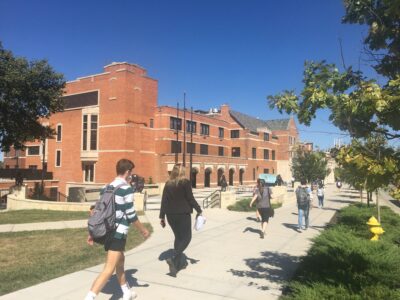Local History: Hunting chickens — a lesson from KU’s earliest days

photo by: Kim Callahan/Journal-World
The University of Kansas campus, pictured in September 2021.
Students arriving for classes at the University of Kansas on Sept. 12, 1866, were unprepared, and they weren’t the only ones.
Chancellor Robert Oliver met for morning devotions with 40 students and the faculty that morning — not just the first for the year, but the first for Lawrence’s new institution.
Clifford S. Griffin, in “The University of Kansas: A History,” wrote of the students:
“Not one of them had an adequate secondary education, nor were any of the fifteen additional students who showed up in the next few days ready for college work.”
The emphasis in the 1860s was on mastery of Latin and Greek, and in 1866 the lack of this command meant that all of them would start in the preparatory department — taking high school classes.
This situation was not what at least two of the three members of the faculty expected. One of them, David H. Robinson, in a reminiscence done in 1891, delves into their expectations and questions in the days before Sept. 12.
“Professor Snow and I started out to call upon our worldly Chancellor. We desired from the official head of the University definite instructions in relation to opening the institution the coming week.”
The pair left their Kentucky Street boarding house and arrived at the chancellor’s study, where they were warmly greeted and invited to join a gathering in progress.
“The air was thick with tobacco smoke,” Robinson wrote, and the people there were “having the jolliest kind of a time”
Robinson and Snow politely declined most offers of smoke and got down to business: What preparations should they make for the university’s opening?
Robinson indicated he and Snow were looking forward to using examination questions to screen high school applicants and receiving certificates from transfers from other institutions.
Oliver’s response was not what Robinson and Snow expected.
“Our genial Chancellor, after considering a moment, kindly gave us our instructions — the most unique, I presume, ever given by the head of a great institution to his colleagues … he said: ‘I would advise you, young gentlemen, to go to Mr. Jaedicke’s gun shop and hire some guns, and to Mr. O’Connor’s livery stable and hire some saddle-horses, and go away back on the hills and hunt prairie chickens. You may be gone two or three days. This will be as good preparation for your work next week as you can make.’
“Saying this, he dismissed us. We were somewhat surprised, to say the least,” Robinson wrote.
The advice, Robinson and Snow thought, scarcely seemed to fit the question, and they “were not yet sufficiently experienced in University work to see the relation between hunting prairie chickens and preparing questions for entrance examinations,” Robinson wrote.
When Sept. 12 came, the general lack of knowledge among students was apparent, as was the chancellor’s wisdom.
Robinson wrote:
“It was now clear that he knew the kind of university we were about to open far better than we,” Robinson wrote, “and that hunting chickens was quite as useful a preparation for it as making long lists of examination questions which would not be needed for years.”
The experience stuck with the men, along with the knowledge that any institution has to begin at whatever point it can actually function at, however modestly that may be.
• Steve Jansen has been a resident of Lawrence since 1974. He was an employee of the Watkins Museum of History from 1977 to 2002 and served as the director from 1979 to 2001.

